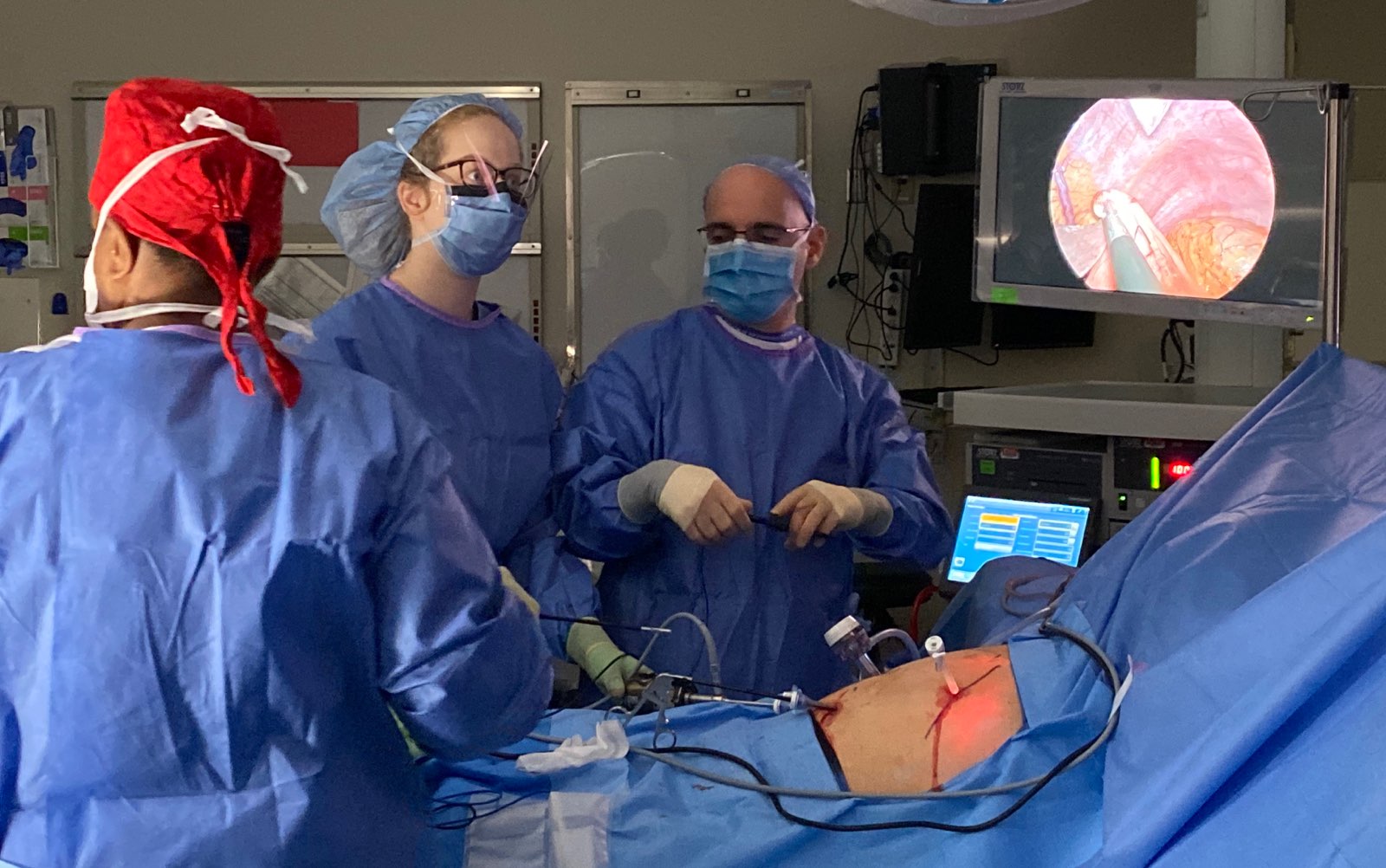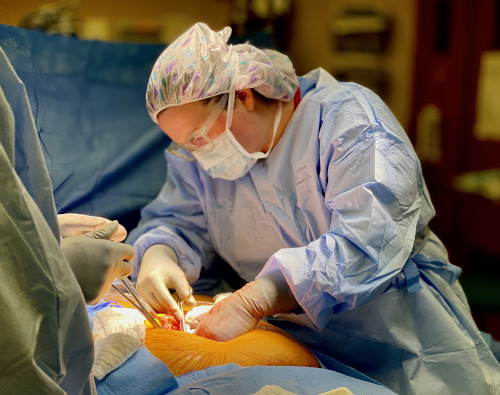Educational Goals & Objectives
The major educational goal of the General Surgery Residency Training Program in the Department of Surgery at the University of Louisville is to produce a board certified surgeon capable of independently practicing general surgery of highest quality.
On completion of the program, the surgeon should have a general knowledge, clinical judgment, the basic technical skills and personality attributes to establish rapport with patients and their families for the practice of general surgery, and be assessed as competent in the six general areas as outlined under the core competencies.
The Accreditation Council for Graduate Medical Education (ACGME), including the Residency Review Committee (RRC) for surgery, has adopted a set of general competencies for all physicians who complete higher training programs. These have been adapted for each specialty. In the near future, all chief residents must be assessed as competent in these areas prior to receiving certification for completion of residency training and undertaking the American Board of Surgery examinations. The six general competencies are:
Patient Care that is compassionate, appropriate, and effective for the treatment of health problems and the promotion of health. Surgical residents must demonstrate manual dexterity appropriate for their training level and be able to develop and execute patient care plans. Our general surgery residents maintain primary responsibility while patients are in the ICU during all rotations at all the hospitals.
Medical Knowledge about established and evolving biomedical, clinical, and cognate (e.g. epidemiological and social-behavioral) sciences and the application of this knowledge to patient care. Surgical residents are expected to critically evaluate and demonstrate knowledge of pertinent scientific information.
Practice-Based Learning and Improvement that involves investigation and evaluation of their own patient care, appraisal and assimilation of scientific evidence, and improvements in patient care. Surgical residents are expected to critique personal practice outcomes and demonstrate recognition of the importance of lifelong learning in surgical practice.
Interpersonal and Communication Skills that result in effective information exchange and teaming with patients, their families, and other health professionals. Surgical residents are expected to communicate effectively with other health care professionals, counsel and educate patients and families, and effectively document practice activities.
Professionalism, as manifested through a commitment to carrying out professional responsibilities, adherence to ethical principles, and sensitivity to a diverse patient population. Surgical residents are expected to maintain high standards of ethical behavior, demonstrate a commitment to continuity of patient care, and demonstrate sensitivity to age, gender and culture of patients and other health care professionals.
Systems-Based Practice, as manifested by actions that demonstrate an awareness of and responsiveness to the larger context and system of health care and the ability to effectively call on system resources to provide care that is of optimal value. Surgical residents are expected to practice high quality, cost effective patient care, demonstrate a knowledge of risk-benefit analysis, and demonstrate an understanding of the role of different specialists and other health care professionals in overall patient management.
These attributes will be acquired over at least a five-year training period by acquiring new knowledge through:
- Clinical experiences
- Reviewing and discussing current literature and major textbooks (Didactic sessions, Journal Clubs, Rotational Conferences, QI/ PI Conferences)
- Attending bedside rounds and conferences
- Preparing reports for presentation and publication (residents are required to produce a manuscript-quality project that is ready for publication to complete their residency).
Knowledge of the clinical course of patient disease will be acquired by managing surgical patients both as in- and outpatients, including management of the critically ill surgical patient. Most importantly, technical skill to perform operations and intra-operative decision-making will be acquired through observation and performance of a variety of surgical procedures within the realm of general surgery over the training period.
The residents will record each operation performed or assisted, in an ongoing fashion, thereby preparing an operative log of case experience. This operative log will be entered directly onto the web-site provided by the RRC for Surgery. Each resident is responsible for his/her own resident data collection for the duration of his/her residency. The ability to convey the clinical course of given patients will be developed by case presentations during walk rounds and conferences. The ability to interact appropriately with referring physicians and consulting physicians will be acquired by periodic communication with such physicians throughout the training period.

The Clinical Experience by Post-Graduate Year
The intern will become familiar with the fundamentals of management and pre- and post-operative care of the general, pediatric, and transplant surgical patient. This goal will be achieved by performance of initial patient assessment including history and physical and interpretation of routine laboratory tests and imaging studies. Additionally, assistance with or performance of certain operations will be carried out. The PGY-1 resident will also acquire knowledge of post-operative patient care by daily assessment of in-hospital post-operative patients on the floor and, as needed, in the Intensive Care Unit. Further knowledge of post-operative care will be learned by attending clinics and management of the patient in an ambulatory setting. Technical skills including basic instrument techniques, suturing, and retracting shall also be learned during the PG-1 year. It is our goal that residents will act as surgeon for some basic cases with proper supervision.
The second year resident will further enhance their skills of peri-operative and operative management by performing additional and more complex operations. These trainees have a primary role in the Intensive Care Unit at most of the major integrated and affiliated hospitals and should be facile with all invasive procedures relevant to ICU care. Skills in surgical specialty services not acquired in the intern year will be done in this year. PGY-2 residents will generally be responsible for presentation of patients during teaching rounds at the VAMC and University Hospital.
During the third year, initial patient assessment skills will be honed by seeing the majority of consultations on the Emergency Surgical Service (Trauma and Acute Care Surgery) at University Hospital, as well as the General Surgical Services at the VAMC. The PGY-3 resident will acquire a full range of technical skills regarding intestinal surgery, laparotomy for trauma, and major resuscitation of the trauma patient. The PGY-3 resident will have met all of the goals for the surgical specialties listed with the exception of the senior rotation in Pediatric Surgery.
During the fourth year of training, the resident should acquire the knowledge, skill and personal attributes to be chief resident while at the major private services at Norton, Norton Children's Hospital and Jewish Hospital. The PGY-4 coordinates a resident team in ongoing patient care and operative case distribution. The PGY-4 resident will routinely communicate with the attending to discuss pre-operative and post-operative patient care and mutually participate in critical decision making. These residents should be able to perform most complicated operations by the end of this year.
The chief year comprises of preparation relevant to assuming independent responsibility for total care of the surgical patient. The chief resident will assume team leadership of various rotations in adult hospitals. The chief residents generally:
- Supervises all in-hospital patient care and outpatient care in the clinics.
- Prepares the morbidity and mortality reports presented at the Quality Improvement Conference
- Becomes familiar with quality assurance issues with a seat on the Quality Assurance Committee at University Hospital.
- Develops clinical decision-making skills by interacting directly with the attending surgeon for critically ill patients and those undergoing operation.
- Supervises and assists junior residents in critical patient care, as well as in performing operations

 Core Competencies
Core Competencies Facebook
Facebook Twitter
Twitter Instagram
Instagram